Editor’s Note: Mr. Sullivan concludes:
In the end, reviewing the report is frustrating. There are serious industry-wide issues about how consumers interact with search engines. There are also serious concerns about what rights publishers should have in regards search engines. These, among others, deserve serious attention. These are also rarely Google-specific issues.
CRE agrees these issues are not unique to Google, thus the need for the FTC to adopt the CRE petition asking for establishment of the standards for reviewing the matter.
Oct 11, 2011 at 9:36pm ET by Danny Sullivan
FairSearch, a group of search companies including Microsoft which lobbies that Google is too dominant, has sent a white paper outlining its anti-trust concerns about Google to the 50 state attorneys general in the US. Below, a review and some fact checking of the paper.
You’ll find the paper here, if you wish to read it directly. I’ve had a run through today (it’s long, 44 pages) and some email exchanges with FairSearch spokespeson Ben Hammer. Here’s my take so far.
Google & The Monopoly Question
The first 10 pages are generally devoted to saying that search is important and that Google has either monopoly power or is dominant in the area. Google would disagree with neither of these conclusions.
In the US Senate hearings, even Google chairman Eric Schmidt agreed that Google had such dominance as to be deemed having monopoly power, which means it it has to exercise special care not to be seen as abusive, a limitation its competitors don’t have to worry about.
For example, much of of the wrong-doing Google gets accused of, such as how it positions its vertical search results, it done identically by its rivals Yahoo and Microsoft. But because of Google’s large market share, conceivably these identical things could be ruled as abusive.
For the record, Google has said that it doesn’t view that it has done anything abusive, and that while it recognizes special care is one of its responsibilities, it feels it has been taking that care.
No One Can Scale To Beat Google?
FairSearch sees things differently, of course. But it’s not until around page 14 that it really starts getting into the detailed accusations, I’d say. It starts out with this:
The inability of Ask.com to survive in the search market underscores the role of scale as a barrier to entry in search. IAC/InterActiveCorp (IAC) paid $1.85 billion to acquire the company in 2005, and thereafter invested heavily to transform Ask.com into an algorithmic search engine competing in the same market as Google. Yet Ask.com was never able to obtain the necessary scale to challenge Google, handling only about 4% of searches in the United States.
As Doug Leeds, President of Ask.com explained when Ask.com ended its search operation in November 2009, the company “did a great job of holding our market share but it wasn‟t enough to grow the way IAC had hoped we would grow when it bought us.”
Well, Blekko would beg to disagree. Blekko launched last year to compete against Google. OK, it hasn’t won any significant market share to speak up, but clearly competitors can enter the space.
One of the member companies of FairSearch would also disagree, that of Microsoft. The whole point of the Microsoft-Yahoo deal, as it was pitched to investors over and over again, was that it would provide the scale to compete with Google.
Keep in mind that when Google launched, Microsoft and Yahoo both had far more scale than Google did. Somehow, Google managed to grow. Maybe the scale argument isn’t as strong a barrier as it’s made out, something that Google’s said about that in the past.
Vertical Search Engines Depend On Google?
The paper goes on to the important role that Google plays in supporting vertical search engines — or suppressing them — or both:
No vertical site, standing alone, presents a challenge to Google‟s general search dominance. Indeed, vertical sites largely depend upon Google for traffic. Most users don‟t navigate directly to vertical sites; instead, they get to the sites via Google‟s search engine….
Taken together, vertical search and other specialized information sites have the potential to attract significant search traffic– and thus advertising revenue–away from Google. They are also a source of innovative services and functionality that consumers find attractive. And, one or more vertical search sites could develop over time into a more significant platform to challenge Google‟s general search dominance.
Here, I can do nothing more than sigh. I have huge amounts of sympathy for a search engine like Yelp. Its CEO Jeremy Stoppelman came across as the most likable, and most hard-done-by person speaking at the Google hearings, on his worries about what Google might do to his company.
But let’s get this straight. These vertical search engines are so great, but yet they depend on Google for their traffic? It’s like saying that Comedy Central is upset that NBC is running promos for its Saturday Night Live comedy show on NBC and not Comedy Central’s own The Daily Show.
Sound absurd? It gets worse. Really, it’s more like Comedy Central complaining that NBC isn’t running enough free ads for The Daily Show on its network, even though NBC already runs so many free ads that the majority of people who tune into The Daily Show do so after NBC tells them to change channels and watch The Daily Show.
Stoppelman testified that Yelp gets 75% of its traffic from Google. 75%! For free, by the way. How on earth does anyone argue that Google has been and currently is harming a vertical search engine like Yelp when it sends that much traffic? I know plenty of sites that wish Google would “harm” them in the same fashion.
By the way, in the same hearing, NexTag — a shopping search engine — argued that it was successful as “one of the biggest companies no one has heard of” because it was good at having “perfected the Google platform.”
Crazy, right? They argue they have no brand, but also that they have a brand that’s being harmed by Google, despite them having perfected getting Google to send them traffic. It all makes no sense.
Google Went All Vertical!
Next, we get this statement:
Google has not been blind to the threat of vertical search engines. In fact, to address the MapQuests, Yelps, and Amazons of the world, Google has changed its entire business approach. Back in the early 2000s, Google was a general search engine that sought to direct users to the sites that were most likely to answer their queries. And because Google’s business was dedicated to search, it had no incentive to skew its results based on an ulterior economic interest. Take a look at Google in 2001:
That screenshot, by the way, FairSearch told me came from the special Google 2001 simulator that Google ran for its 10 year birthday. It didn’t. It actually came from our article about the simulator, which featured a screenshot of how Google actually looked back then, as drawn from my personal files. No, we weren’t credited. That’s ironic for a report that repeatedly attacks Google over allegedly using content without permission.
Google Didn’t Start The Vertical Fire
Now, I have a big perspective piece that I’m trying to finish, with a working title of something like “How Google Shot Itself In The Foot With Universal Search.” The point is that somehow over the last few years, the idea that Google having suddenly launched vertical search has been positioned as some type of new thing, something that a search engine shouldn’t do and that somehow Google either launched or was unusual in doing.
It’s not. It’s not even a Google thing. We had vertical search offered by general purpose search engines since, well, how about AltaVista in 1998:
Oh dear. Look at that. AltaVista offering people search, maps, stock quotes, entertainment search, job search. And it was so big! How could a little search engine like Google ever emerge to challenge it, especially when all the vertical entry points were already locked up.
Here’s Lycos, circa 2002, suggesting that people try its News and Shopping search through tabs:
Here’s Yahoo shoving in links to its Shopping and Auctions areas at the top of the page, in 2002:
It was common for general purpose search engines to have vertical search engines before Google was on the scene. All Google has done is follow what the industry leaders before it did. Those leaders include Microsoft, which has operated a search engine since 1997 and at times one with more share than Google.
For more about this industry-wide evolution to blend vertical search results into general search results — and why it’s something consumers needed — I’d really encourage you to read this past piece from me:
Let’s Talk Disclosure
Next, we get this about whether Google is doing disclosure properly. I’m going to bold a key point:
Google‟s first big shift in incentives came when it introduced search advertising. Once Google entered the search advertising market, it had an incentive to steer people to “paid” links in which Google has an economic interest. But even with this new incentive, two forces held Google in check. First, search engine competition restrained Google from degrading the user experience by leading users to paid links. If Google returned poor search results, users would have used another search engine, like Altavista or Yahoo!. Second, consumer protection concerns forced Google to disclose its economic interests in those links, which led to the separation of and notice of “sponsored” or “paid” advertising links on the search page.
Where it once sought to direct users to web pages as quickly and efficiently as possible, Google now seeks to steer users to its own websites and to prevent users from going to competing websites. And where it once pointed users in the direction of the information they wanted, Google now attempts to provide that information directly to its users – even sometimes when that information was developed by others and does not belong to Google.
The FTC introduced those “consumer protection concerns” about how paid ads should be labelled back in 2002. Google wasn’t “forced” to do any changes because of them. Actually, FTC representatives praised Google, as I wrote then:
In talking with the principal staff members who authored the recommendations, FTC attorneysBeverly Thomas and Dean Forbes, they were extremely reluctant to say which search engines they think have the format for paid placement “right.”
Indeed, as we shall see, the FTC is explicitly trying not to impose a “one size fits all” solution on the search engines, because they all have their own unique ways of presenting information.
Nevertheless, both indicated that personally — not speaking with an official commission viewpoint — they especially like the way Google has handled the situation with paid placement. Google’s paid results are placed in visually distinct colored boxes, separate from the main editorial results. Moreover, they are listed in close proximity to the labels “Sponsored Link” or “Sponsored Links.”
Let’s Talk Recirculation
As for the charge of not sending people away from Google, with all that color-coding, look at this:
What am I missing that Google is doing that Bing is not? At best, you can argue that Bing is showing two additional “free” listings “above the fold” because Google has an extra ad above and that those ads are larger in nature. Of course, trust me, Bing wishes it had more ads to show. So does Yahoo.
Then again, the blue “Google News” items that FairSearch colors to make you think are somehow driving people back into Google don’t actually do that. Each of the links under the “News for casinos” heading drives people away from Google, to news sites themselves.
Over at Bing, the “Listings for Casinos” section that’s shown in blue does the opposite, drives people back into Bing, rather than to the actual places that are listed.
Bottom line. If FairSearch-backer Microsoft is doing the things that FairSearch is upset with Google about, all that seems to demonstrate that Google is following industry practices.
NexTag, Paid Inclusion Disclosure & Irony
Google also gets called out by FairSearch for just saying “ads” rather than “sponsored links.” That’s exactly what Bing does.
Beyond labeling ads, the FTC guidelines from way back also had a specific requirement for disclosure of paid inclusion. I’ve written about this in relation to Google in the past:
- Google Experiments With Paid Inclusion & Does “Promoted” Meet FTC Guidelines?
- Google Blurs The Line Between Paid & Unpaid Results Again
Google has denied, in the past, that there’s any paid inclusion disclosure issue happening or that it does paid inclusion at all. In fact, it was because of Google’s strong stance against paid inclusion that the entire industry dropped the practice, at least the big search engines.
What was paid inclusion? Let’s go to those FTC guidelines:
Paid inclusion can take many forms. Examples of paid inclusion include programs where the only sites listed are those that have paid; where paid sites are intermingled among non-paid sites; and where companies pay to have their Web sites or URLs reviewed more quickly, or for more frequent spidering of their Web sites or URLs, or for the review or inclusion of deeper levels of their Web sites, than is the case with non-paid sites….
In short, through the use of clear and conspicuous disclosures, consumers should be able to easily locate a search engine’s explanation of any paid inclusion program, and discern the impact of paid inclusion on search results lists. In this way, consumers will be in a better position to determine whether the practice of paid inclusion is important to them in their choice of the search engines they use.
This leads me to NexTag. It’s not a FairSearch member, but it was called to testify at the US Senate hearing, and what it testified broadly matches the themes that FairSearch pushes about Google somehow hurting vertical search engines.
Listing 1000s Of Merchants For Free Is Wrong?
NexTag argues that Google directs people to its own product search service, rather than to NexTag, and therefore NexTag is harmed from traffic is apparently is entitled to. In fact, NexTag said that if it tried to launch today, it would get so little traffic as to not be viable.
This matches up to what FairSearch argues. In particular, FairSearch is pushing in the report (and in this blog post) that Schmidt somehow mislead senators in the hearing by saying that Google Product Search doesn’t lead to merchants.
It was an argument Schmidt made to explain that product search doesn’t only benefit Google but also benefits thousands of merchants. Google argues that it refers searchers to its own product search, where they can search and exit Google to merchants across the web.
Let’s say Google changed things. Let’s say Google dropped its own shopping search engine entirely, allowing even more people than already find NexTag to get there. They’d do a search at NexTag and go to merchants that are listed in that search engine.
And how do merchants get listed in NexTag? You pay. You pay, or you don’t play.
NexTag doesn’t disclose this in an easy way for consumers to locate, as the FTC guidelines require. There’s nothing on the help page about it, unless you were a savvy enough consumer to go past the topics written explicitly for shoppers and instead read the seller information and figure this out.
In other words, NexTag thinks that Google is unfairly not sending even more people to its service than it already does, where it can find products from merchants who only appear if they agree to pay, rather than letting people search at Google using Google’s own product search, where merchants aren’t charged to be listed at all.
I haven’t gone through all the FairSearch partners to see if they’re doing paid inclusion disclosure properly. I can tell you that in the vertical search space, I’ve found it’s often the case that the required disclosure isn’t done. If FairSearch is going to be pushing on Google about disclosure, its partners better take a hard look to make sure they meet the already existing requirements out there. Those requirements are for all search engines, not just the big search engines.
Some Sympathy On Local
Of all areas where Google has come under fire, it has been about local listings where I’ve felt the most sympathy for vertical search engines who feel Google’s harming them. You can understand why with this section from the FairSearch report:
Google understands that users are drawn to the search results in the top-left hand corner. Consequently, Google displays many of its own pages at the top or in the middle of the results page as if they were natural search results, without clearly identifying them as Google results. Consider a search on Google for “New York Hotels”:
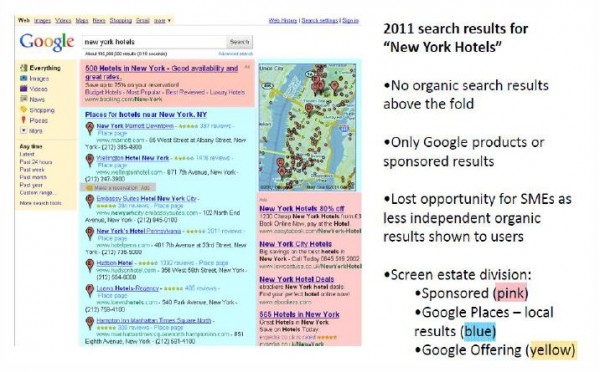
As the screenshot shows, not a single organic search result appears in the area above the fold. Instead, Google ensures that links to its own sites and other sponsored links are placed at the top-left– even when rival verticals are more relevant to users‟ queries. As a result, competing sites lose a significant amount of traffic and revenue because independent organic results are not shown to users.
There’s a lot of space devoted to Google Places, which in turn — until recently — compiled much information from other review sites and suggested that it was all or nothing. If Google couldn’t summarize their reviews, they couldn’t be included in Google at all.
That’s wrong, in my books. Each vertical search engine that Google runs should have its own blocking mechanism. If you want to be in Google Web Search, but not in Google News or Shopping or Places, you should be able to be selective.
Google appears to be cleaning up its act here, and that’s good. But also, let’s look at that search again from FairSearch above, this time side-by-side with Bing: 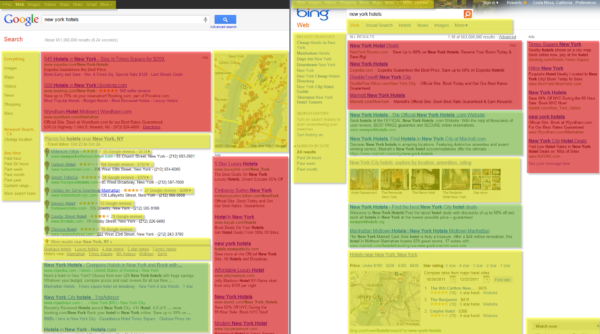
What I’ve done is highlight anything that leads back into either search engine with yellow, anything that’s an ad in red and anything that leads outbound in green.
This is exactly the same search that FairSearch did. The only difference is that I’ve illustrated, as they did not, that many of those links in the Google Places section don’t actually flow all back to Google.
And Even More Allegations
There’s even more to the report, including:
Google said to be hard-coding shortcuts to its shopping search engines, even though these OneBox units — as any good SEO knows — actually float around in various positions on the page. Sometimes, they don’t show at all.
Google is said to be including reviews from local sites like TripAdvisor or Yelp without permission, with proof of this being older screenshots that don’t reflecting the changes that were made in June, which drops content from these sits.
Google does deals to secure being the default provide in browser and phones (Bing and Yahoo do the same)
Google prevents Google Search from being removed from Android phones through its Android compatibility program. The exact quote:
Google protects this dominant position by making it very difficult for mobile operators to remove Google search from Android phones. The principal way that Google has closed and controls the Android platform is via its “compatibility program,” a set of technical requirements imposed by Google.
There are some serious allegations about Google preventing the Skyhook location service from being used, with a compatibility excuse. But I have never, ever heard of an issue being related to Google Search. I’ve personally used devices that were stripped of Google to use either Yahoo or Bing, such as the Samsung Fascinate.
Allegations Are Exhausting
In the end, reviewing the report is frustrating. There are serious industry-wide issues about how consumers interact with search engines. There are also serious concerns about what rights publishers should have in regards search engines. These, among others, deserve serious attention. These are also rarely Google-specific issues.
But reports like these, which are full of exaggerations, half-truths and mistakes rob from that attention. This report, as well as FairSearch overall, seems designed solely to target Google no matter what it takes, no matter what tall tales need to be told.
I find that bizarre, that all this attention seems to be revolving around a tiny number of companies that feel Google is somehow being anti-competitive toward them, rather than around the literally millions of companies that rely on search engines of all shapes and sizes that deserve protection from the search engine industry as a whole.
Should any shopping search engine, that presents itself as a shopping search engine, include any merchant or only those who pay?
Should any local search engine, which ultimately depends on the businesses it lists, have an obligation to let those businesses opt-out of being review or have a guaranteed say on their pages, without concerns of being pressured to buy ads?
Should any search engine always dedicated a percentage of its page to unpaid listings that point outward?
These are all good questions that go beyond Google. These are good question that deserve being explored. Maybe they even will be.
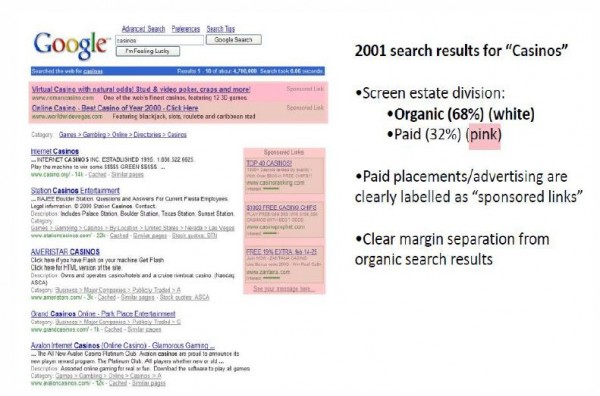

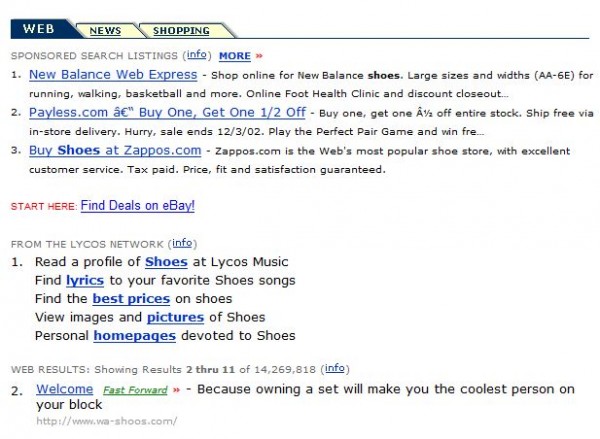
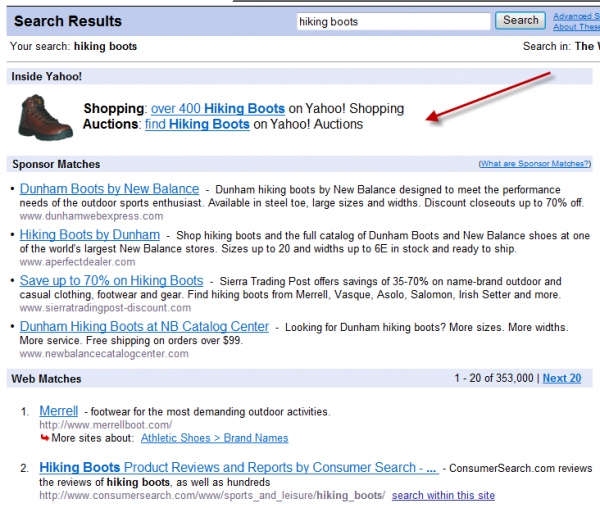


Leave a Reply